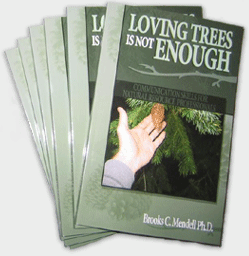|
|||||||||||||||||||
|
Number 9, September 2007 THE LOVING TREES NEWSLETTER =========================== Communicating Your Work Message in the Community ------------------------------------------------ Friends and neighbors in our communities often associate us directly with the reputations and actions of the firms and agencies that employ us. When we see individuals at the store or in line at the post office, they may ask about a new project or upcoming event related to our companies. Often, folks just want to know what we are up to at work, and we owe it to them as members of the community to be able to explain, to the best of our abilities, what we are doing and why we are doing it. Respectful and informative one-on-one communications represent Community Relations 101 and we should recognize these opportunities and their potential. Can one-on-one communication make a difference? You bet. Several years ago at a social function, I met a young manager who worked for Nike. At the time, it had been reported in the news that Nike’s overseas contractors employed underaged workers at their manufacturing facilities. This manager, who had nothing to do with manufacturing, listened respectfully as several people chastised Nike. He acknowledged the issue, shared what he knew about how contractors were audited and expressed how he hoped the issue would be resolved. His patient listening and brief comments initiated a dialogue that left a favorable impression. Communicating our message effectively, whether to simply provide information or to answer direct questions, includes three steps that flow directly from understanding how people learn: 1. Listen actively. Are you listening or are you waiting to talk? The ability to effectively deliver a message is tied to our ability to effectively receive a message. We listen to what other people say – and confirm that we understand what they said – to demonstrate respect for their perspectives. By listening, we help them open up, and, in turn, help them be receptive to what we might have to share with them. In effect, by listening, we earn the right to share different ideas. 2. Make it personal. Certain professions, such as forestry and law enforcement and politics, are uniquely local. The farther away a person is from having direct exposure with our jobs, the more likely they are to rely exclusively on rumors and news stories. By making it personal and sharing our direct experience, we build a relationship which allows us to learn and to share our message effectively. Ultimately, we must put a human face on the work, and that face is our own. 3. Share information through stories and showing. People learn more through stories about your work than from hearing lists of facts about production and quality control. By sharing information through stories and specific examples, we demonstrate what success looks like at work. Talk to the local Rotary Club, show friends your office and introduce neighbors to colleagues. When we engage in these types of conversations, we leave an impression. One, we are sympathetic listeners. Two, we have a personal relationship with our work. Three, we are informed, credible, helpful. And what will happen? Your community, through better understanding and information, becomes a source of feedback and ongoing support for you and your organization. ==================================== The Loving Trees Newsletter. Copyright © 2007 Brooks C Mendell. All rights reserved. We welcome sharing this newsletter in whole or in part if properly cited and attributed. | ||||||||||||||||||
|
|||||||||||||||||||


 to purchase this book through
to purchase this book through








